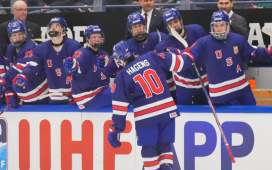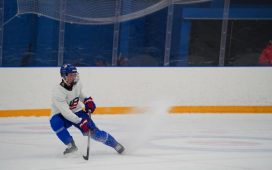Miles Arnone has a story about his introduction to the women’s game, and it’s an up-close-and-personal tale about his eye-opening experience with the talent women’s hockey possesses.
The story, as Arnone tells it, dates back more than two decades to an arena in Concord, Mass., where a bunch of ex-college players turned beer leaguers were presented with an opportunity: an exhibition against a U.S. national women’s squad that was in training prior to the 1998 Nagano Olympics. Arnone’s team accepted, but they took it about as seriously as they would any run-of-the-mill beer-league game, which is to say a few adult beverages were consumed before puck drop with no one in the dressing room was taking the contest all that seriously.
“Then out we went for a three-period, 20-minute, ice-made-between-periods, two-ref, two-linesman game and proceeded to be thumped roundly,” Arnone, a goaltender during his days at Massachusetts Institute of Technology, said. “I think we were down 4-0 after one, and I don’t think it got any better after that. I remember being in the locker room after the first period and the only sound you could hear was people shuffling their feet among the beer cans on the floor. Total silence. Shock and awe. I realized at that point, you know, they really could play.”
If he wasn’t a fan of the women’s game before that outing, he certainly was after, and his relationship with and support of it has only grown in the years since as he skated on co-ed clubs, watched as his daughters slapped on their own skates and took in the professional game in Boston, where he resides.
Now, though, Arnone has a brand new connection to the women’s game: an ownership stake in the NWHL’s Boston Pride.
On Tuesday, the NWHL officially announced that Arnone, a managing partner at private-equity firm Cannon Capital, has led a group of investors in the purchase of the Pride, making Boston only the second franchise in NWHL history to have private ownership and the league’s only non-league owned club as of the 2019-20 campaign. (Pegula Sports & Entertainment, which owns the NHL’s Buffalo Sabres, gave control of the Buffalo Beauts back to the NWHL in May.) The sale was “facilitated by The Sports Advisory Group,” according to the NWHL, and the league stated it is “considering the sale of other current teams and prospective expansion teams to investors genuinely dedicated to the women’s game.”
Arnone, whose firm worked on a sponsorship deal between the league and Crave Better Foods, told The Hockey News Tuesday that talks of purchasing the Pride, or at least discussions regarding independent ownership of the Pride, date back to the early summer. Once the league decided it was open to independent ownership, discussions between Arnone and fellow investors advanced to the point a deal was reached.
But why now? What made this the right time to invest in the women’s game? There’s no one, catch-all answer. In part, it has to do with the scarcity of the resource – “In that sense, it was somewhat opportunistic,” he said – but, simply put, the investors saw an opportunity become available and decided it was one worth pursuing. “Frankly, we all believe very strongly in the importance of building a good, strong women’s professional league, providing opportunities to players, moving to a position where ultimately we can provide them a good working, living wage,” Arnone said. “And that, we believe, goes hand-in-hand with creating a business that’s profitable and sustainable.”
One thing Arnone and Co. did have to consider, however, was the emergence of the #ForTheGame movement and formation of the PWHPA. It was something the group “wanted to think about carefully,” but the investors concluded it was a scenario with which they were familiar: one problem with many different solutions. “I think here you have a situation where the PWHPA has a different view about the best way to achieve really the same goal, which is to create a viable, long-term opportunity for women to play professional hockey and to earn a living doing it,” Arnone said. “We don’t happen to agree with that approach, meaning we, the owners of the Pride and the NWHL, think there’s a better way to do it. But they’re certainly entitled to their opinion, we wish them the best and we’re always open to finding a way to collaborate to solve this puzzle together.”
In the immediate, the Pride can expect some changes. What those changes are, though, remains up for discussion. Arnone met with Boston players and staff Monday, asking them for feedback on what they’d like to see changed. At this point, he’s not ready to make any bold proclamations about how the investment will change player and team development. Arnone did say, however, that the investors are striving to ensure life is made easier for those who juggling full-time jobs and life as a professional athlete. But there is a balance to strike here. In a salary-capped league and as the only independently owned franchise, there is potential for the Pride to flex some financial power to turn into a juggernaut. That isn’t Arnone’s goal, though. “It’s about making it easier but not economically advantaging one set of players dramatically relative to others,” Arnone said. “I think that kind of creates a situation that’s not really good for the league either. You want competitive balance.”
Away from the rink, Arnone’s group will seek sponsorships and invest in exposure. As they’ve just taken over, the calls are only beginning to go out, but Arnone said the reception to sponsoring the Pride has been promising. And Arnone is a staunch believer that if Boston can start packing the building, the game will convert fans, just as he was converted 20-plus years ago.
“When you watch the women’s game at the highest level live, you very quickly realize that it’s very, very high talent level there,” Arnone said. “The quality of the game, the product on the ice is really fantastic. Getting people exposed to that is important, and let’s face it, relative to attending an NHL game, it’s a pretty economical option. There’s a large audience that would appreciate that and would embrace that if we got more exposure. That’s something that we will continue to work on so that people know about it and sample it, and I think we’ll find that as people try it, they’ll like it, so to speak.”
Want more in-depth features, analysis and an All-Access pass to the latest content? Subscribe to The Hockey News magazine.








